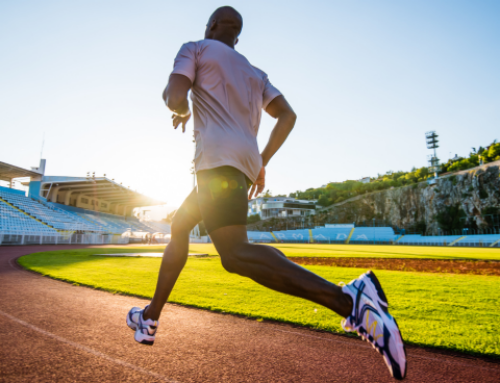4 Tips You Should Follow Before Becoming a Vegetarian
Becoming a vegetarian is a recent diet trend I’ve noticed among my athletes, most notably my female clients. However, this special diet needs to be approached carefully. The wrong approach can result not only in a lack of sufficient nutrition, but also low blood iron (anemia) and even stress fractures. If you already are, or are thinking of becoming, a vegetarian, here are four tips to keep you strong. (See also Special Considerations for Vegetarian Athletes.)
Expand Your Protein Choices
Vegetarians cut out most of the standard protein sources. (See Does a Vegan Diet Contain Enough Protein for Athletes?) They do not consume meat products, and some also avoid fish and eggs. To assure you are meeting your protein needs, think outside the box and try as many different vegetarian sources of protein as you can find—not just peanut butter and cheese. Options like quinoa, edamame, soy nuts, lentils, beans, soymilk and tofu provide at least 8 grams of protein per serving, as much as a cup of milk or an ounce of meat. (See Vegetarian Sources of Protein.)
Don’t Take the Easy Way Out
Frozen tofu burgers, vegetarian bacon and fake chicken may seem like great choices for protein nourishment, but they are all processed foods. That means they contain high amounts of preservatives and salt, so try to limit your intake of these to no more than one per day. (Instead, make these Vegetarian Recipes for the Carnivorous Athlete)
Be Mindful of the Little Things
Since protein is a major concern for vegetarians, micronutrients (specifically calcium, vitamin D and iron) are often forgotten. If you’re cutting out all dairy products (milk, cheese, cottage cheese, yogurt, etc.), try to consume non-dairy sources of calcium—dark, green leafy veggies, broccoli, walnuts, almonds, calcium-fortified soymilk, tofu and chickpeas. To get adequate iron, eat plant-based iron sources such as dark, green leafy vegetables and black beans. To enhance absorption, eat these foods with a source of vitamin C (most darker-colored fruits and vegetables will suffice). Vitamin D is difficult to get from the diet to begin with, but look for fortified cereals and soymilk. Regardless, many vegetarians, especially athletes, need to supplement these crucial nutrients.
Know When to Ask for Help
It’s okay to not know what you are doing. It’s not okay to not know what you are doing and not ask for help. This is when athletes end up in my office with injuries and chronic fatigue. Instead of waiting until you feel terrible, meet with a sports dietitian before you go vegetarian. Sports dietitians can help develop a vegetarian meal plan that will work with your schedule and fulfill your nutrient needs. (Don’t know one in your area? Go to http://www.scandpg.org/.)
Photo: homeopathicpluscentre.com
RECOMMENDED FOR YOU
MOST POPULAR
4 Tips You Should Follow Before Becoming a Vegetarian
Becoming a vegetarian is a recent diet trend I’ve noticed among my athletes, most notably my female clients. However, this special diet needs to be approached carefully. The wrong approach can result not only in a lack of sufficient nutrition, but also low blood iron (anemia) and even stress fractures. If you already are, or are thinking of becoming, a vegetarian, here are four tips to keep you strong. (See also Special Considerations for Vegetarian Athletes.)
Expand Your Protein Choices
Vegetarians cut out most of the standard protein sources. (See Does a Vegan Diet Contain Enough Protein for Athletes?) They do not consume meat products, and some also avoid fish and eggs. To assure you are meeting your protein needs, think outside the box and try as many different vegetarian sources of protein as you can find—not just peanut butter and cheese. Options like quinoa, edamame, soy nuts, lentils, beans, soymilk and tofu provide at least 8 grams of protein per serving, as much as a cup of milk or an ounce of meat. (See Vegetarian Sources of Protein.)
Don’t Take the Easy Way Out
Frozen tofu burgers, vegetarian bacon and fake chicken may seem like great choices for protein nourishment, but they are all processed foods. That means they contain high amounts of preservatives and salt, so try to limit your intake of these to no more than one per day. (Instead, make these Vegetarian Recipes for the Carnivorous Athlete)
Be Mindful of the Little Things
Since protein is a major concern for vegetarians, micronutrients (specifically calcium, vitamin D and iron) are often forgotten. If you’re cutting out all dairy products (milk, cheese, cottage cheese, yogurt, etc.), try to consume non-dairy sources of calcium—dark, green leafy veggies, broccoli, walnuts, almonds, calcium-fortified soymilk, tofu and chickpeas. To get adequate iron, eat plant-based iron sources such as dark, green leafy vegetables and black beans. To enhance absorption, eat these foods with a source of vitamin C (most darker-colored fruits and vegetables will suffice). Vitamin D is difficult to get from the diet to begin with, but look for fortified cereals and soymilk. Regardless, many vegetarians, especially athletes, need to supplement these crucial nutrients.
Know When to Ask for Help
It’s okay to not know what you are doing. It’s not okay to not know what you are doing and not ask for help. This is when athletes end up in my office with injuries and chronic fatigue. Instead of waiting until you feel terrible, meet with a sports dietitian before you go vegetarian. Sports dietitians can help develop a vegetarian meal plan that will work with your schedule and fulfill your nutrient needs. (Don’t know one in your area? Go to http://www.scandpg.org/.)
Photo: homeopathicpluscentre.com












